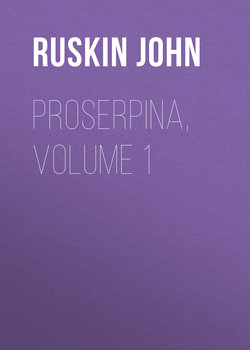Proserpina, Volume 1

Реклама. ООО «ЛитРес», ИНН: 7719571260.
Оглавление
Ruskin John. Proserpina, Volume 1
PROSERPINA
INTRODUCTION
CHAPTER I. MOSS
CHAPTER II. THE ROOT
CHAPTER III. THE LEAF
CHAPTER IV. THE FLOWER
CHAPTER V. PAPAVER RHOEAS
CHAPTER VI. THE PARABLE OF JOASH
CHAPTER VII. THE PARABLE OF JOTHAM
CHAPTER VIII. THE STEM
CHAPTER IX. OUTSIDE AND IN
CHAPTER X. THE BARK
CHAPTER XI. GENEALOGY
CHAPTER XII. CORA AND KRONOS
CHAPTER XIII. THE SEED AND HUSK
CHAPTER XIV. THE FRUIT GIFT
INDEX I
DESCRIPTIVE NOMENCLATURE
INDEX II
TO THE PLANTS SPOKEN OF IN THIS VOLUME, UNDER THEIR ENGLISH NAMES, ACCEPTED BY PROSERPINA
INDEX III
TO THE PLANTS SPOKEN OF IN THIS VOLUME, UNDER THEIR LATIN OR GREEK NAMES, ACCEPTED BY PROSERPINA
Отрывок из книги
Yesterday evening I was looking over the first book in which I studied Botany,—Curtis's Magazine, published in 1795 at No. 3, St. George's Crescent, Blackfriars Road, and sold by the principal booksellers in Great Britain and Ireland. Its plates are excellent, so that I am always glad to find in it the picture of a flower I know. And I came yesterday upon what I suppose to be a variety of a favourite flower of mine, called, in Curtis, "the St. Bruno's Lily."
I am obliged to say "what I suppose to be a variety," because my pet lily is branched,1 while this is drawn as unbranched, and especially stated to be so. And the page of text, in which this statement is made, is so characteristic of botanical books, and botanical science, not to say all science as hitherto taught for the blessing of mankind; and of the difficulties thereby accompanying its communication, that I extract the page entire, printing it, opposite, as nearly as possible in facsimile.
.....
12. "Grant but as many sorts of mind as moss." Pope could not have known the hundredth part of the number of 'sorts' of moss there are; and I suppose he only chose the word because it was a monosyllable beginning with m, and the best English general expression for despised and minute structures of plants. But a fate rules the words of wise men, which makes their words truer, and worth more, than the men themselves know. No other plants have so endless variety on so similar a structure as the mosses; and none teach so well the humility of Death. As for the death of our bodies, we have learned, wisely, or unwisely, to look the fact of that in the face. But none of us, I think, yet care to look the fact of the death of our minds in the face. I do not mean death of our souls, but of our mental work. So far as it is good art, indeed, and done in realistic form, it may perhaps not die; but so far as it was only good thought—good, for its time, and apparently a great achievement therein—that good, useful thought may yet in the future become a foolish thought, and then die quite away,—it, and the memory of it,—when better thought and knowledge come. But the better thought could not have come if the weaker thought had not come first, and died in sustaining the better. If we think honestly, our thoughts will not only live usefully, but even perish usefully—like the moss—and become dark, not without due service. But if we think dishonestly, or malignantly, our thoughts will die like evil fungi,—dripping corrupt dew.
13. But farther. If you have walked moorlands enough to know the look of them, you know well those flat spaces or causeways of bright green or golden ground between the heathy rock masses; which signify winding pools and inlets of stagnant water caught among the rocks;—pools which the deep moss that covers them—blanched, not black, at the root,—is slowly filling and making firm; whence generally the unsafe ground in the moorland gets known by being mossy instead of heathy; and is at last called by its riders, briefly, 'the Moss': and as it is mainly at these same mossy places that the riding is difficult, and brings out the gifts of horse and rider, and discomfits all followers not similarly gifted, the skilled crosser of them got his name, naturally, of 'moss-rider,' or moss-trooper. In which manner the moss of Norway and Scotland has been a taskmaster and Maker of Soldiers, as yet, the strongest known among natural powers. The lightning may kill a man, or cast down a tower, but these little tender leaves of moss—they and their progenitors—have trained the Northern Armies.
.....